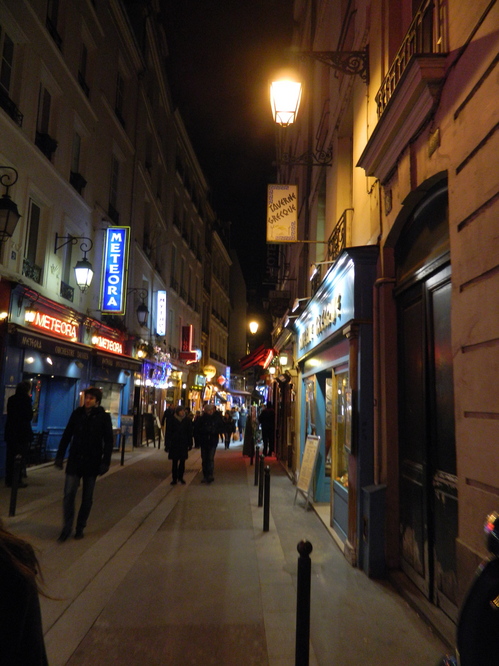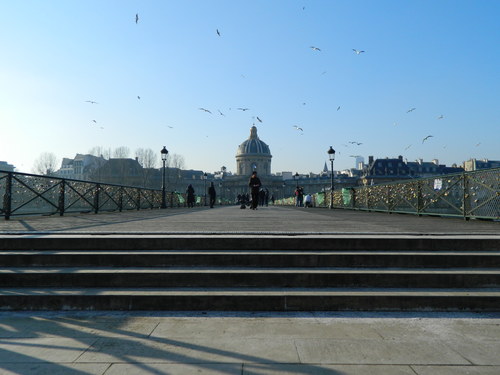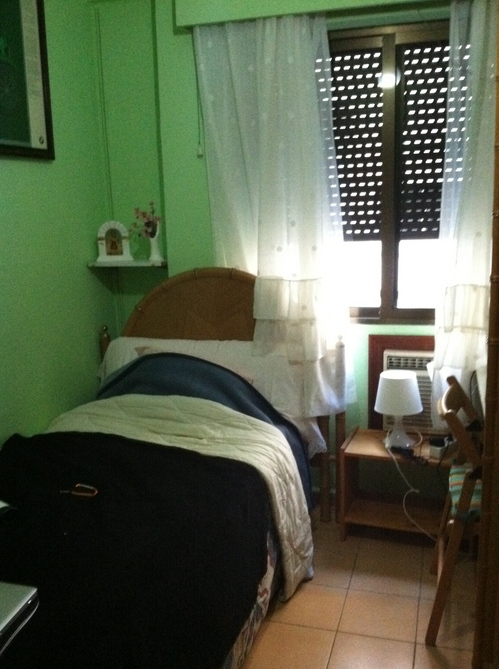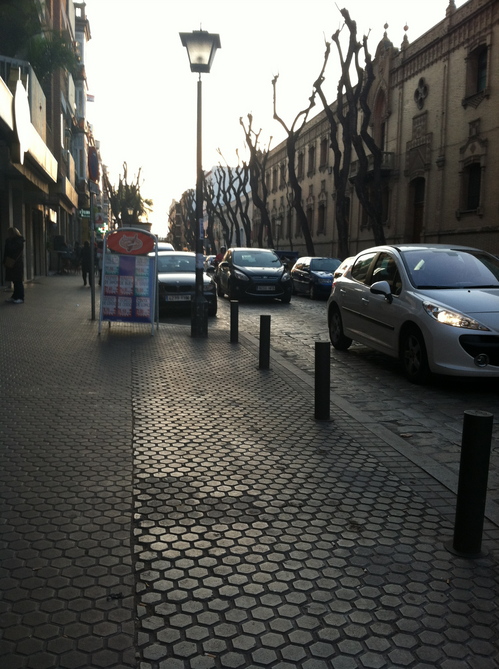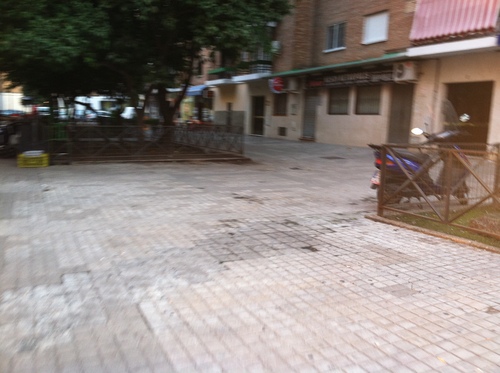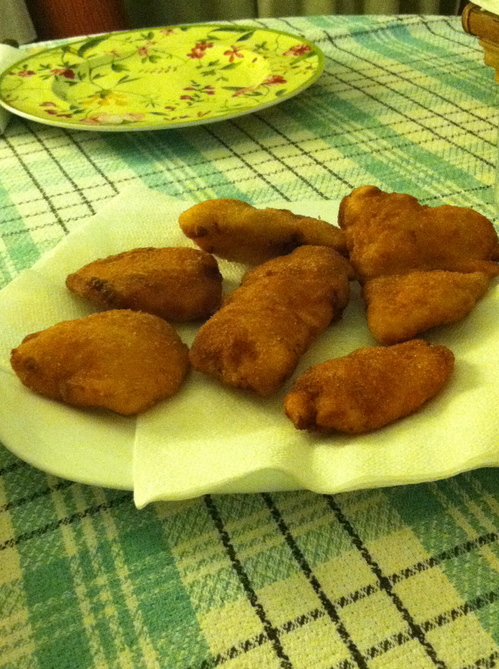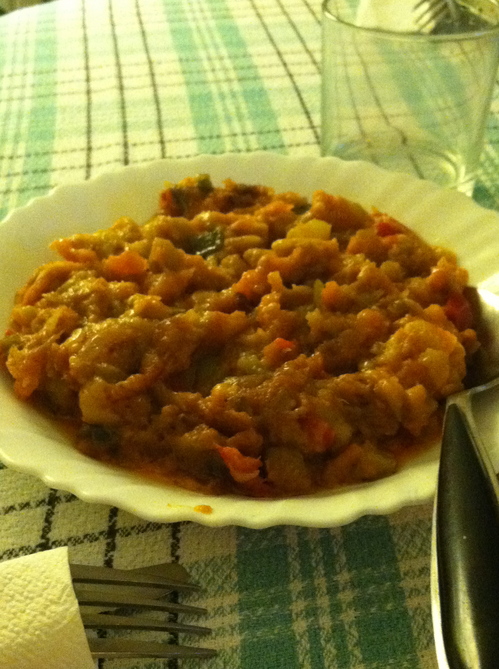The nonstop jolts of the plane wake me and outside the window I see endless chains of mountains. It’s as if I am floating above a 7th grade art project made of mounds of brownish red clay and powder sugar for the extra touch of snow on the very tips. The clouds are like cotton candy, airily encompassing the tops of the highest peaks. Then they disappear into the still world of complete flatness. Homes and farmland appear in a miniature depiction of a far off town that seems hidden to the world by the height of the surrounding landscape. The plane is low as if we should be landing within seconds, but we don’t. Instead, we continue at the same altitude, watching the scenery change below like a set of rotating slides until I see it. The details, the water, a beautiful city below, and we have touched down.
Goosebumps rise from the bare skin of my arms and legs from the cool air caused by the boat’s movement. There is mild cloud coverage, as the weatherman would say, but the sun still shines with force through my sunglasses. The water creates an opaque floor of aqua blue around the ferryboat. It is the color of the sky before a storm colored by an artist in a shade of sea foam green. The surrounding city, lacking buildings over two stories in height, floats effortlessly, like a barge, in the water. The muted colors of the stone homes are breathtaking, their true beauty having been revealed through age, every creaking door and wrinkle of paint telling a story. In this moment age is desirable, sought after even.
The midnight black of the gondolas makes this feel like a ride at Disney World. Everyone but the tourists seem to fit. Elongated boats seamlessly shift in and out of my focus, maneuvering through the maze of water bearing roads. The light is blinding, reflecting off their glossy coated exterior wood. Their sleek design something of envy for my Naval Architecture brother. I too am envious of their impeccable look, having the desire to one day return and float effortlessly through the passageways of Venice in such a magnificent boat. Possibly a clich� desire, as even the captain bears a white sailors hat for dramatic effect. However, clich�s are developed for a reason. They are the most beautiful sights and words imaginable, only formed from peoples’ longing to experience them for themselves.
Although Venice is a readily used location in movies and artwork, even the cinema cannot do justice to Venice’s delicacy. It is picturesque and accomplished, paradisiacal in every flaw. I could sit beside the water’s edge for hours, watching the various boats shuffle before me, and I do. The Rialto Bridge stands only twenty feet to me left, covered in specs of tourists rotating toward the railing to capture the ideal reminder of their vacation to the city of water. The sounds emitting from my headphones provide a soothing soundtrack to the image. My feet dangle only inches above the liquid road and a mob of people with busy days shuffle in either direction behind me. The words of varying languages mix into almost the buzzing of a beehive, only audible if you perk your ears toward the source. I don’t want this moment, this perfectly unplanned and spontaneous image before me, to dissipate into the slow breeze of the air surrounding me, and an underlying happiness begins to flood my emotions like a cresting wave.
The bell tower of St. Mark’s square is smaller in stature than Big Ben. The layers of red brick climb high into the sky, topped with a Peter Pan shaped hat of warn green tin. The downscaled size in Epcot seemingly exact, only the surrounding buildings here creating a varied atmosphere. The square is too large to see in its entirety from one vantage point, the mass of tourists acting like fog, detracting from its visibility. Two story buildings painted in white with arc shaped openings etched out from the second story line one portion of the square. Cafes line the streets in front, the only division from one to the next being the change in color of the chairs surrounding white linen drawn tables being set by waiters in full suits. Classical music pours from every corner as we walk, being produced by tux wearing musicians playing amongst the tables of every caf�.
At night the Grand Canal is inspiring but not lit up and glowing in the darkness of night like most cities. Instead, the weathered walls are nearly invisible, the buildings’ colors undistinguishable. At dinner we are given a lesson of elementary Italian, learning the manners of saying hello by our waiter. Soon thereafter the table beside us is filled with three Italian couples wearing cocktail dresses and suit jackets, laughing, sharing stories while they easily empty a bottle of wine. Upon the recommendation of the waiter, I order a pasta dish consisting of spaghetti, oil, garlic, and pepper flakes. The portion is one-third the size served in American restaurants and immediately quiets my hunger, while still saving room to enjoy the promised gelato. The open door of the restaurant allows a slight breeze to persist throughout our meal. Later, by our hotel, the winding streets of too expensive to even enter stores are full of life as families and friends alike embrace their vacations.
The next morning I end the trip in the same awe as I entered, the cool breeze off the water sending my loose hair flowing in a desired direction, a slideshow of buildings shifting before me, and a smile of contentment on my face as I cherish the thirty minute boat ride to the train station.
I step off of the train in Verona confidently, a week’s worth of possessions thrown into my school backpack. Using only the picture I took of the “you are here” sign at the train station we make our way to the hotel easily. Our balcony actually overlooks the very tracks we just left, to either side sit quaint Italian style homes with a small town feel. I jump on my bed and am instantly in heaven! The pillow is made from the material of a down comforter, an upgrade from the one hundred year old square of a pillow that lacks density that I sleep with in Seville. The comforter forms perfectly to my body and I let out a sigh of relief. It’s going to be so nice to be home again. Suddenly missing the comforts I am accustomed to.
After the recommendation of the hotel, the guide of a map, and grumbling stomachs, we head into the main part of the city with our first destination being food. We are thinking Italian! The sight of the main town is absolutely stunning, exactly what I would expect from quaint Italy. The number of tourists is minimal and as we walk down the jagged sidewalks we see locals embracing each other, having run into one another on a day out with their families. Family operated restaurants and bakeries fill the first floor of most building in the town’s center. The endless noise being produced from our hours of hunger place a pause in our enjoyment of the scenery. It is almost three o’clock and we only ate bread and Nutella this morning for breakfast. We make a half turn and follow the hotel’s recommendation to a nearby pizzeria. Luckily we only have to comb through a few winding side streets before recognizing the restaurant’s sign.
A patio is set up outside of the front door, housing two full tables of patrons. We pause a moment at the entrance as we gain stares from those within sight. I am accustomed to being seated or instructed by the minimum, a sign, to seat myself. As is the norm in Europe we simply choose a table within easy view of the waitress. When I seat myself menus instantly appear on the table, along with cups and silverware. My mouth is now watering at the immanent idea of the pizza that will soon appear before my waiting eyes. After learning our Italian is, well, nonexistent, the waitress repeats herself in broken English confusing even a native speaker with her words. From our blank stares and mum lips, she decides to repeat herself again. “The kitchen closed. I can’t give you food. Open at six.” Why would you give me a menu if you can’t make any food? Is this some mean trick you all play on tourists because I can clearly see the locals eating next to me? “I’ll let you think about that and decide.” She says before she disappears inside. What is there to decide?
We uncomfortably stand, the squeaking from the metal feet of my chair against the cobblestone street don’t make this defeat any less awkward, others’ stares making me feel as if I am being observed under a microscope, outside of my natural habitat. As soon as we are no longer within earshot we both simultaneously burst into laughter like a firework on the fourth of July. Instinctually my hand reaches toward the pain in my stomach, my body hunched over in an almost standing fetal position. When I attempt to walk my feet only stumble over each other, almost causing my body to lose balance and fall toward the stone floor. After regaining some composure, we recount the previous moment having decided to eat at the next restaurant we pass. We enter the main road again, our mouths parched with thirst, our mind causing daydreams of food, but every restaurant door is closed. Every sign reading: Lunch: 12-3pm, Dinner: 6-9pm. WHAT? “We have to wait three more hours?” I cry out as if I am in excruciating pain. “How hard is it to find a slice of pizza in Italy?” I ask rhetorically as we stammer along.
In an effort to distract ourselves from the likely fact that our stomachs are currently self-mutilating themselves for relief, we select sight seeing as a distraction. In the middle of the main street sits an amphitheater. Its location in the middle of the road is similar to a tree forceful enough to break through the very center of a dirt walkway, causing everyone to choose a side for travel. It’s stone is a lighter brown, faded by the same powerful sun that causes varying shades of exterior paint of an older home to wear. The amphitheater is miniature compared to the dwarfing size of the Coliseum in Rome. Only a few blocks to the left of the landmark we see a stone archway. The warn stone is unrecognizable under years of names and stories handwritten and painted in a rainbow of colors, like wallpaper covering the original beauty of a home. The twenty-foot long archway leads into a small square formed by the exterior of three different buildings. Above and to the right, protruding from the stone is a perfectly weathered, hand carved balcony straight out of a fairytale book from my childhood. There is even a hint of familiarity in its design. This is Juliet’s balcony, from Shakespeare’s story of Romeo and Juliet. It is simple yet elegant and breathtaking in an optimistically romantic kind of way. As if all women will one day have a balcony similar, where the love of their lives will climb to reach them. Standing here, watching the hundreds of people in awe around me, I understand why our World needs fairytales and movies with happy endings; we need the hope. We need this ideal to get us through until we meet someone we love exactly in the World in which we live, reality. I capture the image in the reflection of my eyes before relinquishing my spot for someone new to admire its beauty and significance.
The next day I choose a car in the middle of the train, upon recommendation of my brother years ago before I left on my first solo train ride. “Always remember to pick a seat in the middle of the train,” he instructed, “If there is a collision that will be the safest place to be.” Ever since, I have followed his directions as precisely as possible.
At the first sight of two empty seats together I drop down my bag. Seconds haven’t passed before we are being instructed of something in Italian. The woman appears to be in her late thirties and is gesturing to the two empty seats across from us. I shake my head apologetically. “Do you speak English?” I nod my head in answer. In fluent English she explains to us that we have assigned seats on our tickets, we are currently sitting in hers. She is kind, no glimpse of anger in her eyes. As I relinquish my seat to her I feel as if I am a helpless child, requiring the aid of others to care for me. Here I am, in her native country, not following the rules and she is forced to explain them to me in a second language. Suddenly I’m embarrassed at myself that I hadn’t even bothered to learn simple phrases in Italian before my trip. I was selfish in knowing that I would likely always be able to find someone to translate for me. I pride myself on my independence but now I realize how much of this trip I will need to rely on someone else’s assistance.
An hour and a half later we step onto the platform in Milan and make our way toward the street while searching for hidden signs to lead us to our hotel. The surrounding buildings remind me of a typical American city, like the New York City of Italy. There are far less historical sights than most tourist destinations. Instead, four and five level shops more intricately designed than I have ever seen before fill the void. The buildings are so tall that there is no distance to be seen from street level. A mix of languages creates a roar in the bustling streets from an eclectic mix of ethnicities. This diversity is something that was missing from Venice and Verona.
The famous shopping district does not disappoint. It is home to everything from Louis Vuitton to Rolex. The buildings here are different than those of the remaining city and lower end shopping streets, giving off a cozier homey feel. Their heights are more modest and are painted in warm hues. Red Ferraris are casually parked outside the store entrances. The locals are dressed as if they are all headed to a formal ball; sparkling heels and diamond jewelry are the norm. Those dressed more casually still pair jean shorts with a sophisticated cotton candy pink business jacket and Gucci sunglasses. The clothing of the children matches the atmosphere perfectly. A six-year-old boy is dressed in pine needle green pants paired with a collard dress shirt and a navy blue sweater, even though he is climbing a jungle gym at a nearby park.
The main park in the area is reminiscent of the grounds of Central Park in New York. Tall trees and large grassy openings are connected with dirt paths. On one side of the park a carnival like setting has been constructed. From balloons and cotton candy to water rides and prize-winning games it is every little kids dream location, in a city with everything else one could desire.
Our next stop is the Duomo, and elegantly carved church. The exterior walls so intricately carved into a beautiful masterpiece of art left to the elements. The stone is the color of whipping cream, points carved from the roof as if warding off an attack from above. Every inch has been purposefully designed into a flawless appearance. Even upon close investigation the hits of a chisel have been forgotten, smoothed over by time.
Nearby sits a gelato shop recommended to us by a fellow abroad student. The shop is located on a corner, its double doors held open by a mob of waiting patrons. Under close observation, through the cracks of moving bodies, we think we have learned the system. It’s similar to a deli counter. You pay the cashier, receive a slip strewn with a number, and then you wait to be called. The cashier hands me my slip, number 60. I look up toward the current number highlighted on the wall above, 21. This is going to take a while, but it looks like it will be worth it. With gelato on every corner in the city, like Starbuck in the U.S., there must be a reason this place has sixty people waiting for their gelato. When my number is called I push through the waiting mass to the counter. The cone-bearing employee asks my preference of chocolate. Behind him sit three chocolate fountains of milk, white, and dark chocolate, respectively. “Milk,” I decide. I then ask for a mix of vanilla and Nutella gelato flavors but the LANGUAGE BARRIER is lifted. The confused look on his matches mine like a pair of mimes. A few uncomfortable moments pass before he says something in Italian, I nod, leaving my dessert at his mercy.
He hands me his creation, it is almost a work of art. Two layers of creamy glue textured gelato have been layered over the milk chocolate filled homemade cone, drizzled with warm Nutella and stuck with a purple colored tasting sized spoon and wafer cookie. The bottom flavor is the beige of an Army uniform, the top as pure as snow. I don’t make it through the crowd and out of the shop before a spoonful has made it to my salivating mouth. The warm Nutella is the icing of a freshly baked cupcake, melting down the sides from the force of gravity. The taste of white chocolate ignites my taste buds and there is the sensation of a silky smooth wave of flavor coating my tongue. Never before have I tasted a flavor so perfectly matched and exact, indescribable and unimaginable.
The flavor below I decide is peanut butter, tasting as if scooping a creamy spoonful into your mouth, without the consequence of it sticking to the roof. At the bottom of the cone lies the biggest present of all, as if saving the best for last on Christmas day, a pot of gold, a pool of warm chocolate. It hasn’t soaked through the cone nor dripped through the point, instead it simply waits patiently. Simply put, the best gelato I have ever tasted.
Now off to Germany:
It’s like I’m lost in a forest at night, the world around me unrecognizable to all degrees. I see the faint figure of a sign in the distance but can’t determine its meaning. Suddenly, like the liberty of a dam, a flood of people circle around me, shuffling past in oblivion of my need for help. The train station in Frankfurt is as large in stature at Grand Central only German words mines well be Chinese characters because they offer no aid. I can’t even find an exit! Note to self: always learn the word for exit before traveling to a foreign country. The language is unsettling at first, the pronunciation sounding infuriated with one another as they speak.
We move toward a wall, as if to provide protection from the imminent probability of our trampling. We stare at the large city map painted on the wall, German words flooding my sight. I don’t even know where to begin. Our hotel is outside the city, making this more of a struggle, but after navigating the metro stations flawlessly in Paris, Madrid, and London I am an amateur, unable to even find metro lines let alone navigate toward our destination. Helpless as we can be we stare blankly, unsure really of what we should do. This hasn’t ever happened to us. I feel like a lost child searching frantically for her mother in a bustling crowd, too short to see the faces of the passersby. Out of the corner of my eye I see a group of police officers about to pass so I catch their attention and ask for help.
A young man stops the group and patiently listens to my hopeless situation. His face is kind and not hard on the eyes I notice. With bleach blond hair freshly cut, childish dimples and a kind smile he looks to be around 24 and more than willing to help. He immediately pulls out his phone, typing in the address for directions as he instructs, in German, another officer to search the wall size map beside us. It is a full force effort with four officers helping us. “Come with us,” the officer says as he faces me. We comply and begin to walk with them through the train station, the entourage of officers makes it appear to those around us as if we are on our way to German prison, somewhere I don’t have a desire to see.
The architecture of the homes is castlesque, free standing, with the use of different angles and even the occasional rounded pillar. A mix of beige and a variety of deep chocolate browns coats the homes and trim respectively. Together the buildings that have been kept through history are stunning, their small town feel unmistakable. Small, hand painted wooden signs hang outside taverns and show glass windows, displaying traditional German fair. The skyscrapers that have been built over the rubble of historic bombings dwarf this area of aged buildings in Romerberg. At eye level the city disappears, the landscape appearing to have been painted into the pages of a storybook. A large river slices seamlessly through the city, separating the tourists and businessmen with the locals.
We venture to the tourist free area and enter a tavern with endless rooms of picnic benches, gaining stares from ever local who need no more than seconds to realize the elephant we have brought into the room. We are instructed to sit next to strangers, two German girls appearing in their late twenties. I receive confirmation of the local atmosphere when I open the menu to find nothing but German strewn across the busy pages. There isn’t even a picture to be found. Upon entering we saw a green wreath hanging beside the door, signifying that the restaurant served a local favorite, homemade apple wine and luckily we have the aid of a travel book to recommend what to order as our main meal.
On the other side of town is a full market, complete with fresh vegetables, flowers, nuts, raw meats and sausages, pastries, and homemade pastas. The colors and rows of displays are almost overwhelming, stacked on top of one another, one snowflake away from an avalanche. I can see a line forming in front of a makeshift window next to a meat counter full of extremes, including cow tongue. They appear to be purchasing precooked sausage, almost like a hot dog stand outside a baseball game. I decide to be a follower and risk eating mystery meat so I enter the back of the line. When my turn approaches I simply point to the women before me, signifying I want the same thing, partly because it looks edible and more so because I have no idea what anything on the menu means. I receive a large, thick part hotdog part sausage with a pretzel roll and spicy mustard splattered on the side of my paper plate. I decide not to dissect the ingredients of the meat before the first taste. To my surprise it is delicious, no fowl taste to be found. It has been heated, cooked likely in a pot of steaming water and the meat’s juices are liberated with every bite. The mustard is intense, and packs a punch even when outsized by the sausage, however the flavors mix seamlessly, creating a new and welcomed flavor. I have come to learn that sometimes street food gives more to the local taste than most fancy restaurant ever can.
Our next stop is Munich, home of the 1972 Olympic games. The location has, for the most part, been preserved, though its space seems empty, only jogging enthusiasts and bicyclists use the open-air walkways today. Swimmers of all ages and abilities glide through the pool where Mark Spitz beat the then record for most number of gold medal earned. Only the forgotten ticket booths have been left to rust besides the once marvelous stadiums. It is known as Olympic Park for a reason and yields long stretches of green grass, park benches, and even a man made lake.
The next morning we decide to visit Neuschwanstein castle, located outside of the city. We cross the platform at a run and explode onto the train through the first open door only to find rows and rows of seats, all occupied. Not a single space available. The next train isn’t for another hour and there isn’t time for second thoughts as the train has already been placed into motion. We find space in the bike car consisting of five fold down seats, already occupied, row of bike racks on all sides, and empty space, to stand. Really? It’s a two and a half hour ride. My timidity only last moments until I let my knees buckles and my butt land on the plastic covered floor. It takes me a few minutes to realize what I am hearing around me, English. Everyone is speaking English! It’s almost as if this eclectic group of Americans have been arrested and thrown into the cargo space of the train for transport to our certain doom in jail, having been planned, practiced and implemented to a T in order to summon the Americans to the dirty floor of a bike car. Beside me lye three college students from Chicago and one from Australia who are all studying Abroad in England this semester. In front of me, sitting on the improvement of a plastic fold down chair are a mother and daughter pair on a trip given for the girl’s high school graduation. Next to them is a mother visiting her grown daughter currently working in Germany and next to her is a young retired, previously enlisted, member of the Air Force, with whom we spend the remainder of our day.
The castle is grand in stature, stretching high into the snowcapped mountains lined with forests, surrounding it like a green blanket. The sun creates a glow around the stone bearing angles of its architecture causing my eyes to squint as I take in its beauty. The location is serene, a butterfly in a lonely forest, sitting upon nothingness, taking joy in the silence and breathtaking 360 degree view.
The view from the window of the train during the return trip is no less enchanting. Tall pine trees stretching into the sky make lines of divides in healthy hills of green grass, snow covered mountains acting as their back drop. Small homes, all with matching reddish brown roofs and beige walls sit in the open fields of the hills with stacks of fresh chopped wood awaiting the winter months, no neighbors in sight. Isolation, beauty on all sides, the mountains so far away yet an essential part of the landscape. The clouds wrap the tops of the highest mountain peaks in a loose hug, the other peaks protrude arbitrarily into the clear blue sky above at jagged angles. Only the sound of the train as it rolls by disrupts the peacefulness of the surrounding earth.
As I walk through the metal detector at the Munich airport the next day en route home, or should I say the airport two hours outside the city in as much of a field as Penn State, I am thanked for not setting off the alarm to the metal detector, presumably making the jobs of the grateful, wand bearing employees on the other side much easier. Unfortunately I can’t say my encounter with the next employee is as cordial.
I understand when I am asked to unzip my bag after it exits x -ray but shortly thereafter regret my comprehensive response when she continues speaking to me in rapid German. I wait for her to finish and simply say, “sorry?” with eyebrows drawn and a very confused look on my face. I can see it form, the smile illuminating her face, and she bursts into laughter at my incompetence. When the laughter is subdued she begins again, this time in English.
She is rummaging through my bag, apparently having a complaint with the way I pack and fail to follow German security protocol. My prepackaged packets of Nutella I took from the hotel are supposed to be in my bag of liquids, my camera must be turned on to ensure it can’t be used as a weapon, and she confiscates my small jar of salsa. My salsa! Excuse me but I do not consider my jar of salsa, sitting next to my half eaten bag of tortilla chips a liquid let alone a threat to national security. I call it breakfast, or at least it was supposed to be. Now, if they had confiscated my chips with it I would have know she was just hungry, trying to pilfer the food for her own enjoyment.
I spend the next three hours sitting on a plane returning to Spain, my stomach growling, and my tired mind day dreaming of my se�ora’s meal upon my return.
Location: Venice, Italy; Verona, Italy; Milan, Italy; Frankfurt, Germany; Munich, Germany








